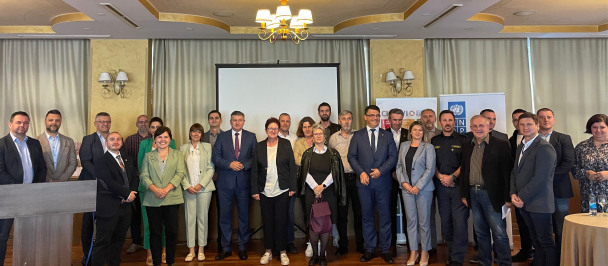Within the Joint Programme of the Government of Switzerland and United Nations (UN) “Disaster Risk Reduction for Sustainable Development in Bosnia and Herzegovina”, the training on “Disaster Risk Reduction Project Management” was held in Sarajevo. The training was attended by the representatives of the partner local governments of Banja Luka, Bihać, Bijeljina, Kakanj, Kalesija, Gradačac, Prijedor, Sanski Most, Srebrenica and Trebinje, from the sectors of protection and rescue, education, social and child protection, health and agriculture. The diversity of the sectors represented in the training was aimed at ensuring a multi-sector approach in their work, with a focus on vulnerable groups of population in the local communities.
This training along with two previously organized sessions, on “Climate Change, Disaster Risk Reduction and Sustainable Development” and “Disaster Risk Management and Decision-Making During a Disaster”, aims to improve disaster risk reduction (DRR) skills and mechanisms to deal with disasters in ten partner municipalities.
“Disaster Risk Management is a task of utmost importance which needs to be on top of the agendas of municipal authorities, as well higher-level authorities. There is only one way to reduce the effects of the natural catastrophes, and this is by understanding better the hazards, taking preventive measures, and developing response capacities. We know this from our own experience in Switzerland, as well as you here in Bosnia and Herzegovina. The local governments have great responsibility to make their municipalities more disaster resilient, to prepare and protect the citizens against the harm of natural disasters, and establish preconditions for sustainable development”, stated Swiss Ambassador to BiH Daniel Hunn during the ceremony.
Daniel Hunn, Swiss Ambassador to BiH and Snježana Keserović
Sukhrob Khoshmukhamedov, UNDP Deputy Resident Representative underlined “The COVID-19 pandemic demonstrates that disasters can instantly destroy the economy and development efforts made over many years. We are all aware that local communities are the ones that are facing most of the consequences of the disasters and have biggest responsibilities to minimize negative effects of disasters. The Joint Swiss-UN Programme is designed with aim to support municipalities to become more resilient and this training is one of the steppingstones to better preparedness.”
The Disaster Risk Analysis System – DRAS (www.drasinfo.org ) – was introduced through the implementation of the Joint Swiss-UN Programme in BiH in all ten partner local governments and the representatives of the local Platforms for Disaster Risk Reduction were trained in the use of the DRAS system. DRAS provides citizens a quick access to the information on hazards with a view to increasing their awareness about a disaster risk and allows decision-makers to assess spatial risks combined with the data on hazards, the use of land and vulnerabilities.
The knowledge and skills acquired in the training along with the DRAS system will enable the partner municipalities to use the spatial data, scientific analyses and information on vulnerabilities during disaster risk assessments as well as to properly plan priority DRR measures and projects which should be mainstreamed in the development strategy papers.
“Disaster Risk Reduction for Sustainable Development in Bosnia and Herzegovina“ is 8.4 million KM worth joint programme of the Government of Switzerland and the United Nations (UN), implemented by the UN agencies: UNDP, UNICEF, UNESCO, UNFPA and FAO in partnership with domestic authorities.
The Joint Programme aims to address key disaster risk reduction (DRR) priorities identified by ten local governments and various stakeholders across various sectors: protection and rescue, education, social and child protection, health, and agriculture. The Programme puts special emphasis on improving local DRR coordination and strategic planning mechanisms, with focus on addressing the needs of the most vulnerable population groups.
Sukhrob Khoshmukhamedov, UNDP Deputy Resident Representative in BiH and Aleksandar Koprivica

 Locations
Locations






